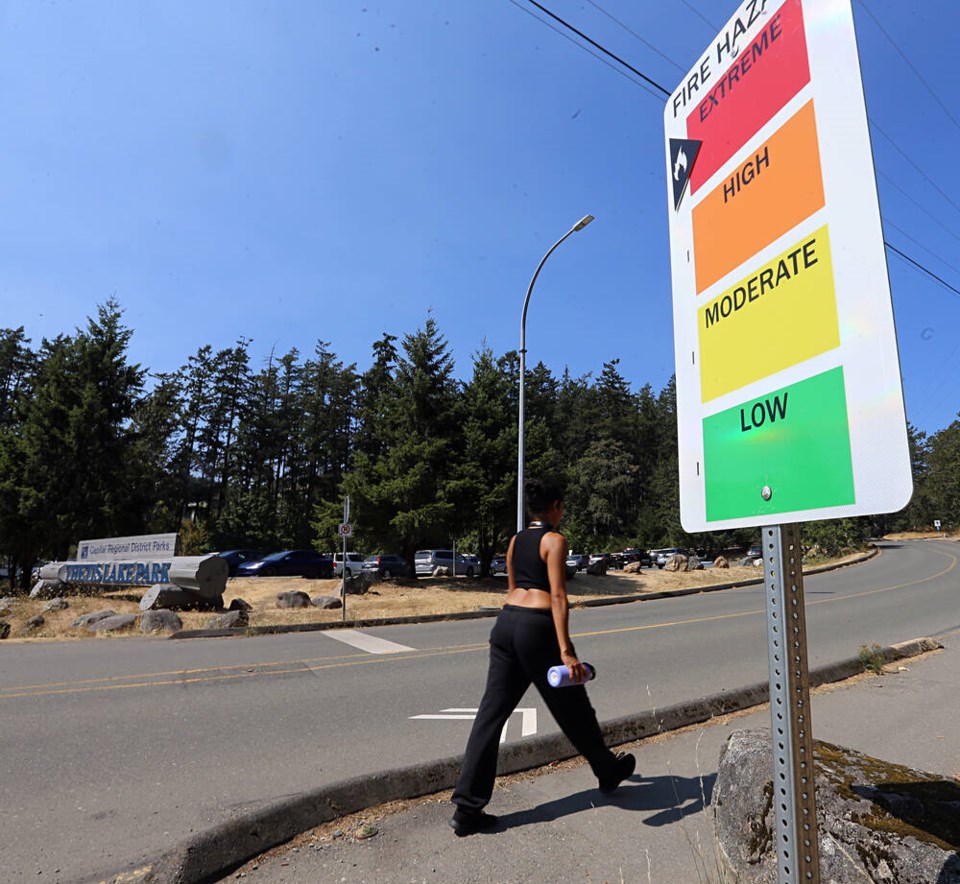Amid news of the devastating wildfires in the B.C. Interior, residents of Greater Victoria are becoming much more concerned about the region’s dry conditions, fire officials say.
We traditionally have dry summers, but they seem to be getting drier and the dry periods are lasting longer, said View Royal Fire Rescue Capt. Troy Mollin. And people have become very wary of others tossing cigarettes or doing anything that could lead to a fire, he said.
“People are a little bit more outraged and it’s because they’re sensitive to what’s going on in the province.”
“They’re worried and obviously it’s more highlighted because of what’s going on regionally and globally in terms of wildfires,” he said. “People are starting to pay attention more and have more concern, and police themselves and their neighbours a little bit more than normal.”
Mollin said that “fire-smart” steps for homeowners include keeping lawns short, keeping roofs and gutters clear of leaves and debris, trimming dry or dead branches away from homes, cleaning off decks, and separating wooden fences from homes with metal gates.
Owners of large, rural properties that have an interface with an area like View Royal’s Thetis Lake Regional Park or parts of the Malahat can especially benefit from doing such simple things, he said.
Sidney Fire Chief Brett Mikkelsen said it can make “a huge difference” around homes.
Highways-maintenance crews also take steps at this time of year like keeping grassy medians trimmed, Mollin said.
“That keeps the spread of any fire a lot slower and there’s less fuel for them to burn,” he said. “Also it keeps a lot of the smoke down, which makes it safer for traffic.”
Thetis Lake park is watched carefully and is “tinder dry” right now, Mollin said.
“It is a no-smoking area, and now more than most times of the year it’s really important that people heed that warning,” he said.
Central Saanich Fire Chief Kenn Mount said his department’s emergency-response exercise in June focused on the area around ȽÁU,WELṈEW̱/John Dean Park and emphasized the value of fire-prevention measures for homes and of having knowledge of evacuation procedures.
The department has its own fire-smart co-ordinator in firefighter Ryan Vantreight, Mount said.
“He’s out there, he’s boots on the ground,” Mount said. “It’s really crossing into emergency management and neighbourhood emergency preparedness, as well.”
Despite the declaration of a provincial state of emergency, the department has still been dealing with things like fires on the beach at Island View, he said.
Mikkelsen has also noted the public giving added attention to fire risks. “Rightfully so.”
The region’s smoky skies from Interior fires in recent days have cemented the reality of the situation in the province for people here, Mikkelsen said.
Mikkelsen said he was in Lahaina on Maui less than a year ago, and what has happened there has “really brought it home” to him how quickly a fire can spread.
He said his department currently has a fire truck helping in Lillooet and Deputy Fire Chief Mike Harman is in Kelowna helping to battle wildfires.
Harman is managing about 50 pieces of apparatus in Kelowna, Mikkelsen said.
“We have a long history of assisting B.C. Wildfire going back to 2003.”
Both the Central Saanich and View Royal departments have personnel in the Interior, as well.
Reducing risk around your home
B.C. FireSmart’s Emergency Wildfire Preparedness Checklist includes the following:
• Monitor fire events and do as advised by local officials.
• Have a grab-and-go bag ready at home with such things as food, water, a flashlight, a first-aid kit and prescription medications.
• Preregister for emergency-support services through the B.C. Services Card app.
• Make your home fire-smart by clearing dead plants and leaves within 10 metres of your home, moving combustible items like propane tanks, patio furniture and firewood 10 metres from your home, and keeping vegetation away from combustible fences.
• Check to see that all vents are in good condition,
• Prior to an evacuation, turn off air conditioning, water, electricity and gas, and close doors, windows and skylights.
>>> To comment on this article, write a letter to the editor: [email protected]



